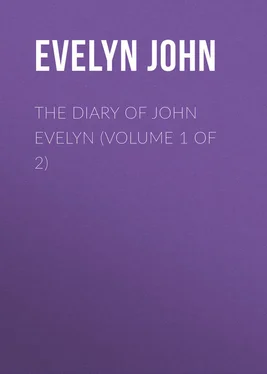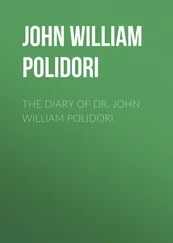John Evelyn - The Diary of John Evelyn (Volume 1 of 2)
Здесь есть возможность читать онлайн «John Evelyn - The Diary of John Evelyn (Volume 1 of 2)» — ознакомительный отрывок электронной книги совершенно бесплатно, а после прочтения отрывка купить полную версию. В некоторых случаях можно слушать аудио, скачать через торрент в формате fb2 и присутствует краткое содержание. Жанр: История, foreign_antique, foreign_prose, на английском языке. Описание произведения, (предисловие) а так же отзывы посетителей доступны на портале библиотеки ЛибКат.
- Название:The Diary of John Evelyn (Volume 1 of 2)
- Автор:
- Жанр:
- Год:неизвестен
- ISBN:нет данных
- Рейтинг книги:3 / 5. Голосов: 1
-
Избранное:Добавить в избранное
- Отзывы:
-
Ваша оценка:
- 60
- 1
- 2
- 3
- 4
- 5
The Diary of John Evelyn (Volume 1 of 2): краткое содержание, описание и аннотация
Предлагаем к чтению аннотацию, описание, краткое содержание или предисловие (зависит от того, что написал сам автор книги «The Diary of John Evelyn (Volume 1 of 2)»). Если вы не нашли необходимую информацию о книге — напишите в комментариях, мы постараемся отыскать её.
The Diary of John Evelyn (Volume 1 of 2) — читать онлайн ознакомительный отрывок
Ниже представлен текст книги, разбитый по страницам. Система сохранения места последней прочитанной страницы, позволяет с удобством читать онлайн бесплатно книгу «The Diary of John Evelyn (Volume 1 of 2)», без необходимости каждый раз заново искать на чём Вы остановились. Поставьте закладку, и сможете в любой момент перейти на страницу, на которой закончили чтение.
Интервал:
Закладка:
October 14, 1688. – The King's birthday. No guns from the Tower as usual. The sun eclipsed at its rising. This day signal for the victory of William the Conqueror against Harold, near Battel in Sussex. The wind, which had been hitherto west, was east all this day. Wonderful expectation of the Dutch fleet. Public prayers ordered to be read in the churches against invasion.
It might be difficult to produce a nearer approximation in secular literature to Daniel's " Mene, Mene, Tekel, Upharsin ."
There is little else in the Diary equally striking, though Evelyn's description of Whitehall on the eve of the death of Charles the Second ranks among the memorable passages of the language. It is nevertheless full of interesting anecdotes and curious notices, especially of the scientific research which, in default of any adequate public organization, was in that age more efficaciously promoted by students than by professors. De Quincey censures Evelyn for omitting to record the conversation of the men with whom he associated, but he does not consider that the Diary in its present shape is a digest of memoranda made long previously, and that time failed at one period and memory at the other. De Quincey, whose extreme acuteness was commonly evinced on the negative side of a question, saw the weak points of the Diary upon its first publication much more clearly than his contemporaries did, and was betrayed into illiberality by resentment at what he thought its undeserved vogue. Evelyn has in truth been fortunate; his record, which his contemporaries would have neglected, appeared (1818) just in time to be a precursor of the Anglican movement, a tendency evinced in a similar fashion by the vindication, no doubt mistaken, of the Caroline authorship of the "Icon Basilike." Evelyn was a welcome encounter to men of this cast of thought, and was hailed as a model of piety, culture, and urbanity, without sufficient consideration of his deficiencies as a loyalist and a patriot. It also conduced to his reputation that all his other writings should have virtually perished except his "Sylva," like his Diary a landmark in the history of improvement, though in a widely different department. But for his lack of diplomatic talent, he might be compared with an eminent and much applauded, but in our times somewhat decrescent, contemporary, Sir William Temple. Both these eminent persons would have aroused a warmer feeling in posterity, and have effected more for its instruction and entertainment, if they could occasionally have dashed their dignity with an infusion of the grotesqueness, we will not say of Pepys, but of Roger North. To them, however, their dignity was their character, and although we could have wished them a larger measure of geniality, we must feel indebted to them for their preservation of a refined social type.
EDITOR'S INTRODUCTION
E velynlived in the busy and important times of King Charles I., Oliver Cromwell, King Charles II., King James II., and King William, and early accustomed himself to note such things as occurred, which he thought worthy of remembrance. He was known to, and had much personal intercourse with, the Kings Charles II. and James II.; and he was in habits of great intimacy with many of the ministers of these two monarchs, and with many of the eminent men of those days, as well among the clergy as the laity. Foreigners distinguished for learning, or arts, who came to England, did not leave it without visiting him.
The following pages contribute extensive and important particulars of this eminent man. They show that he did not travel merely to count steeples, as he expresses himself in one of his Letters: they develop his private character as one of the most amiable kind. With a strong predilection for monarchy, with a personal attachment to Kings Charles II. and James II., formed when they resided at Paris, he was yet utterly averse to the arbitrary measures of these monarchs.
Strongly and steadily attached to the doctrine and practice of the Church of England, he yet felt the most liberal sentiments for those who differed from him in opinion. He lived in intimacy with men of all persuasions; nor did he think it necessary to break connection with anyone who had ever been induced to desert the Church of England, and embrace the doctrines of that of Rome. In writing to the brother of a gentleman thus circumstanced, in 1659, he expresses himself in this admirable manner: "For the rest, we must commit to Providence the success of times and mitigation of proselytical fervors; having for my own particular a very great charity for all who sincerely adore the Blessed Jesus, our common and dear Saviour, as being full of hope that God (however the present zeal of some, and the scandals taken by others at the instant [present] affliction of the Church of England may transport them) will at last compassionate our infirmities, clarify our judgments, and make abatement for our ignorances, superstructures, passions, and errors of corrupt times and interests, of which the Romish persuasion can no way acquit herself, whatever the present prosperity and secular polity may pretend. But God will make all things manifest in his own time, only let us possess ourselves in patience and charity. This will cover a multitude of imperfections."
He speaks with great moderation of the Roman Catholics in general, admitting that some of the laws enacted against them might be mitigated; but of the Jesuits he had the very worst opinion, considering them as a most dangerous Society, and the principal authors of the misfortunes which befell King James II., and of the horrible persecutions of the Protestants in France and Savoy.
He must have conducted himself with uncommon prudence and address, for he had personal friends in the Court of Cromwell, at the same time that he was corresponding with his father-in-law, Sir Richard Browne, the Ambassador of King Charles II. at Paris; and at the same period that he paid his court to the King, he maintained his intimacy with a disgraced minister.
In his travels, he made acquaintance not only with men eminent for learning, but with men ingenious in every art and profession.
His manners we may presume to have been most agreeable; for his company was sought by the greatest men, not merely by inviting him to their own tables, but by their repeated visits to him at his own house; and this was equally the case with regard to ladies, of many of whom he speaks in the highest style of admiration, affection, and respect. He was master of the French, Italian, and Spanish languages. That he had read a great deal is manifest; but at what time he found opportunities for study, it is not easy to say. He acknowledges himself to have been idle, while at Oxford; and, when on his travels, he had little time for reading, except when he stayed about nineteen weeks in France, and at Padua, where he was likewise stationary for several months. At Rome, he remained a considerable time, but, while there, he was so continually engaged in viewing the great variety of interesting objects to be seen in that city, that he could have found little leisure for reading. When resident in England, he was so much occupied in the business of his numerous offices, in paying visits, in receiving company at home, and in examining whatever was deemed worthy of curiosity, or of scientific observation, that it is astonishing how he found the opportunity to compose the numerous books which he published, and the much greater number of Papers, on almost every subject, which still remain in manuscript; to say nothing of the very extensive and voluminous correspondence which he appears to have carried on during his long life, with men of the greatest eminence in Church and State, and the most distinguished for learning, both Englishmen and foreigners. In this correspondence he does not seem to have made use of an amanuensis; and he has left transcripts in his own hand of great numbers of letters both received and sent. He observes, indeed, in one of these, that he seldom went to bed before twelve, or closed his eyes before one o'clock.
Читать дальшеИнтервал:
Закладка:
Похожие книги на «The Diary of John Evelyn (Volume 1 of 2)»
Представляем Вашему вниманию похожие книги на «The Diary of John Evelyn (Volume 1 of 2)» списком для выбора. Мы отобрали схожую по названию и смыслу литературу в надежде предоставить читателям больше вариантов отыскать новые, интересные, ещё непрочитанные произведения.
Обсуждение, отзывы о книге «The Diary of John Evelyn (Volume 1 of 2)» и просто собственные мнения читателей. Оставьте ваши комментарии, напишите, что Вы думаете о произведении, его смысле или главных героях. Укажите что конкретно понравилось, а что нет, и почему Вы так считаете.












